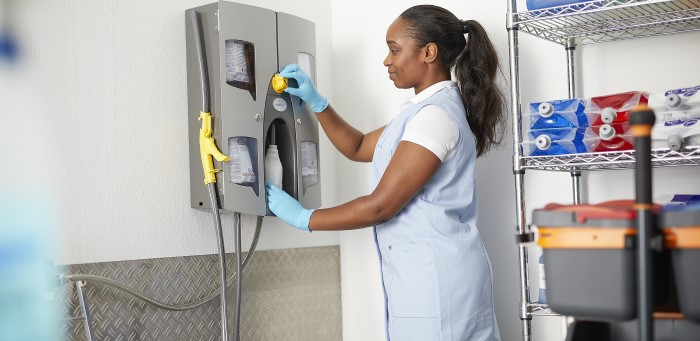"Sustainable" is a broad term that is explained in many ways.
With it, many sustainability claims and assumptions are not always justified.
To clarify the most common ambiguities, we have compiled an overview of facts and myths about sustainability with regard to professional cleaning.
Fact or myth? “Sustainability refers only to environmental aspects”
Myth. Green comes in many shades! The confusion arises because people think sustainability is exclusively about the environment. It isn't. Sustainability means ensuring a good balance between the social, economic, and environmental aspects of business activities.
Fact or myth? “Sustainability is expensive”
Myth. Sustainable products do not have to be more expensive than ordinary items. Certainly not at Diversey. We have made the choice to certify our dishwashing detergents with the EU Ecolabel and/or Nordic Swan. Our customers pay a similar price for these products.
Fact or myth? “An EU Ecolabel product has a reduced impact on ecosystems”
Fact. The EU Ecolabel is the official European eco-label. The label is only awarded to products with a reduced impact on the environment compared to similar products.
Fact or myth? "Our products are biodegradable"
Fact and myth. You may have heard this more often as a selling point. Strictly speaking, all products are degradable and organic compounds are biodegradable. Hard rock is a mineral and will never bio-degrade. Surfactants in detergents and cleaning agents' biodegradability are regulated in Europe by the Detergents Regulation. This European legislation requires complete biodegradability for all surfactants in detergents and cleaning agents. This Regulation sets out the tests to be used to prove degradability. Complete biodegradation means that the substance is completely broken down by microorganisms (bacteria) into carbonic acid, water, and possibly mineral salts.
Fact or myth? "To clean sustainably, I should only use EU Ecolabel products"
Myth. Sustainability goes beyond the label. Overdosing an EU Eco-certified product is still harmful to the environment. Proper dosing reduces the environmental impact. While we recognize that example EU Ecolabel plays play an important role in your choice of a sustainable alternative, we develop our sustainability vision beyond certification to help you with your broader sustainability goals. Greener and safer chemistry is important, but not at the expense of product, packaging, and shipping waste.
Deploying a dosing system adds to cost efficiency and safety, and also makes your organization more sustainable with less impact on the environment through reduced production, transport, storage, use, and disposal of waste. You save up to 99.6% in packaging material compared to ready-made products by using e.g the dosing system QuattroSelect.

Fact or myth? "A ready-to-use product creates more plastic waste and transport"
Fact. Using highly concentrated products instead of ready-to-use or standard cans significantly reduces environmental impact by reducing packaging waste and transport.
Fact or myth? "Eco-detergents do not work as well"
Myth. Several studies have shown that the performance of sustainable cleaners is as good as a common ready-to-use.
Fact or myth? "You definitely need to use more product with eco-detergents!
Myth. Sustainable cleaners are as effective as standard cleaners, at the same dosage. No more product is needed.
Fact or myth? "A dosing system lowers the impact on the environment"
Fact. Products require storage space, generate packaging waste, and need to be transported. The use of highly concentrated products in lightweight packaging will reduce the amount of plastic packaging and improves transportation as you do not pack and move water: it is added later on-site to provide the final solution.



